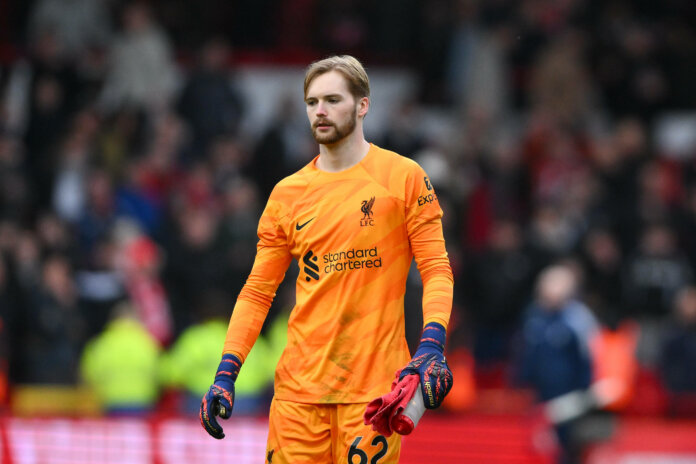Navigating Liverpool’s Goalkeeping Conundrum: The Case of Caoimhin Kelleher
Deciphering Liverpool’s Backup Dilemma
Liverpool’s strategy for managing their goalkeeper roster has sparked considerable discussion, particularly concerning Caoimhin Kelleher’s future at the club. Recent comments from football analysts Karl Matchett and Dave Hendrick on the Anfield Index’s podcast have shed light on this topic, revealing the complexity of decision-making that goes behind the scenes.
Karl Matchett suggests a valuation for Kelleher if he were to leave: “I think there’s an argument that £20 million has to be the start point, but it may be that he goes for less to allow him to leave.” This statement opens up a broader discussion about the intrinsic value of a high-calibre backup goalkeeper in today’s market.
Kelleher’s Contribution and Ambition
Dave Hendrick provides context to Kelleher’s situation, reflecting on his playing time and ambitions, “He played 26 games in all competitions this season, whereas previously he had played 21 games in his entire career.” This increased exposure has evidently given Kelleher a taste of regular first-team football, something he seems eager to continue.
Furthering this point, Hendrick cites an interview where Kelleher expressed a desire to seek more consistent playtime: “He made it clear in the interview with James Pearce that he wants to go and play, so I think it’s for the best to facilitate that.” The desire for more regular play is a common theme among second-choice goalkeepers, who often find themselves at a crossroads: continue as an understudy or seek starting opportunities elsewhere.
Financial and Tactical Play
Discussing the financial implications, Hendrick argues the pragmatic approach would be to capitalize on Kelleher’s market value: “I would definitely be in the sell camp, I just don’t think that we can have a £20 million back-up keeper.” This statement points to the economic realities facing top clubs, where the balance between squad depth and financial sustainability must be carefully managed.
Liverpool’s approach to nurturing goalkeepers could be seen as a revolving door of talent, readying them for either first-team roles or profitable exits. Hendrick hints at a possible strategy: “I think the ideal scenario is that we make Jaros our second choice for a couple of years and then do the same with him and then once Pitaluga is ready, repeat that trick again.” This method not only ensures a pipeline of capable goalkeepers but also maintains financial health through periodic player sales.
Evaluating Liverpool’s Strategy
From a strategic viewpoint, Liverpool’s handling of Kelleher’s situation is indicative of a broader philosophy. It’s about balancing the footballing aspirations of individual players with the club’s broader financial and competitive goals. Kelleher’s case is particularly interesting as it touches upon several crucial aspects: player development, squad management, and financial strategy.
The club’s ability to nurture talents like Kelleher, only to potentially sell them on, might seem cold but is strategically sound. It ensures that the player gets the career progression they desire, while the club maintains a robust financial standing and squad depth.
However, there’s an underlying risk in this strategy. The constant churn of backup goalkeepers can disrupt squad harmony and consistency, elements that are as crucial off the pitch as on it. Moreover, integrating new players consistently requires resources and can create periods of adjustment that might not always align with competitive timelines.
Conclusion: A Delicate Balance
As Liverpool navigates Kelleher’s future, the decision will likely hinge on multiple factors: the player’s personal ambitions, the club’s tactical needs, and the ever-important financial implications. While £20 million for a backup goalkeeper might seem steep, in the grand scheme of Premier League finances and given the player’s proven capabilities, it might just be the right move for all parties involved.
In conclusion, Liverpool’s management of Kelleher’s situation will be a telling indicator of how they plan to manage similar challenges in the future. It’s about finding the right balance between being a stepping stone and a final destination, between economic sense and sporting success.



